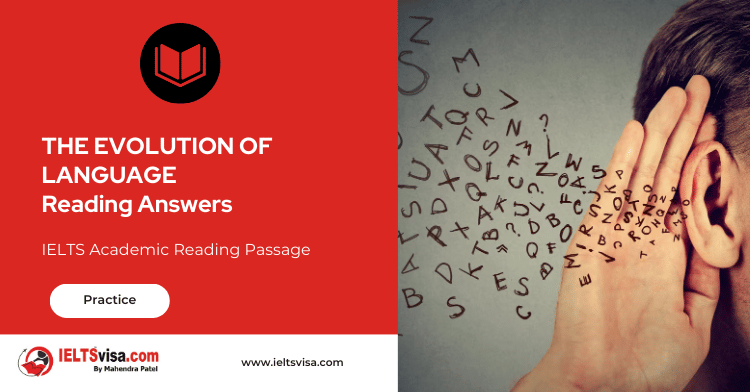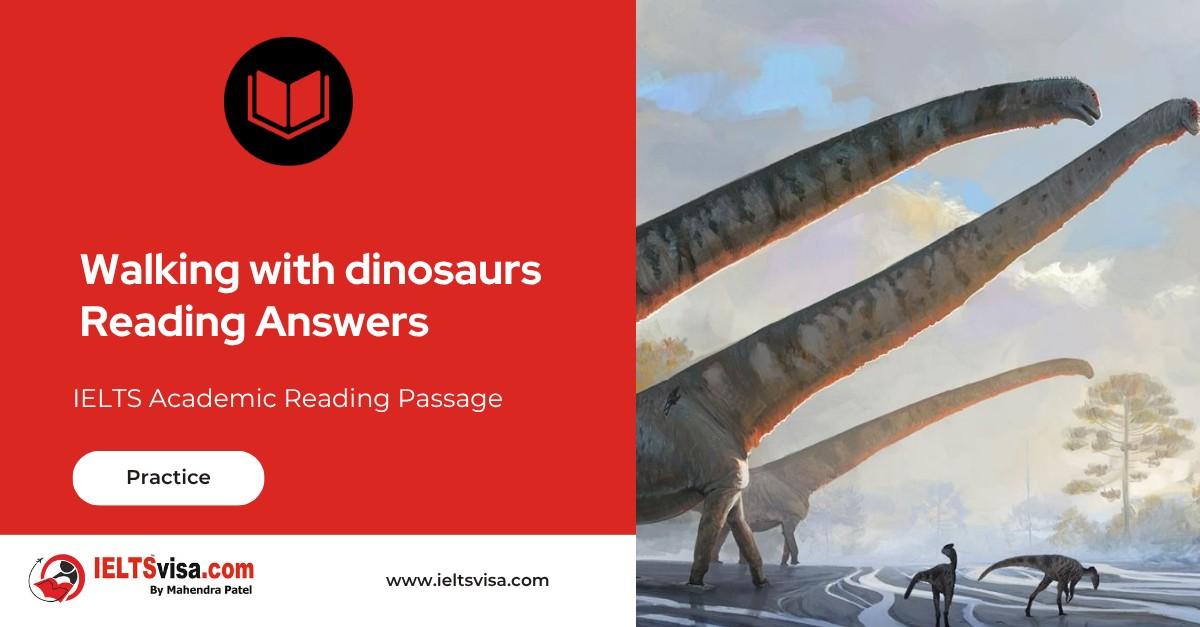THE EVOLUTION OF LANGUAGE Reading Answers
IELTS Academic Reading Passage
A. Language everywhere changes over time; it has to. A central reason that necessitates modification is to allow for developments in our world to be expressed. For example, the technological revolution alone has been responsible for the addition of a plethora of words to our vocabulary: hard drive, software, modem to name just a few. The Japanese writing script katakana, which was originally introduced in the 9th century as a means by which Buddhist monks could correctly interpret Chinese pronunciations, is now most commonly used to embrace foreign words for which there is no original Japanese character; pizza or hamburger for example. Likewise, the western world’s exposure to and familiarity with foreign cultures now means that words such as sushi, nan bread, and kebab, for example, are used by diners regularly.
B. However, the expansion of our vocabulary is just one element involved in how and why language evolves. Given the variation of dialects or regional accents present in most language systems, it is clear that an individual’s interpretation of what is correct and commonly used will vary quite dramatically since this perception is based upon a combination of factors including the age, educational level and region of the country a person is from. As we go about our daily lives and interact with others from different backgrounds and experiences, the language we hear is often taken on board and incorporated into how we communicate ourselves. Many phrases with American origins are now commonplace in British English for example, due to the frequency with which they are heard on television and in the movies.
C. Changes in language are often driven by the young and many such changes are commonly considered by older people to be a disintegration of standards rather than an evolution and an improvement. Let’s consider an Americanism commonly used by youngsters in all pans of the English speaking world. Used as an alternative to “Tom said…” it is now commonplace to hear “Tom goes, the pay rise was unacceptable.” or, “Tom was all, the pay rise was unacceptable.”; much to the horror of many traditionalists. However, this modification could also be considered to be adding to and not detracting from our ability to communicate effectively. To illustrate, let’s consider the original phrase “Tom said”; it is used solely to show the listener that we are reporting the words of Tom, while the modern variation, “Tom goes” has the same meaning. However, if the speaker chooses instead to use the latter phrase, “Tom was all”, they are also able to convey the message that Tom had an emotional reaction to the situation they are reporting, therefore a much more effective method of communicating information has been created, some may say. However, should the now commonly used texting abbreviations such as ‘gr8t’ (great) and ‘l8r’ (later) become permanent replacements of the original words, it is likely that even the most liberal amongst us would be horrified.
D. Variations on the language are usually more readily accepted into informal language before being absorbed for use in formal writing. Examples of words that we now commonly use, but were once considered incorrect, are ‘pea’ and ‘hopefully’. Let’s take pea; it derived from the word ‘pease’, which is an uncountable noun that has the same form regardless of whether one or more pease were being spoken about. However, this was commonly overlooked and misunderstood, and through error, the singular form of the vegetable became ‘pea’. More recently ‘hopefully’ was considered by many to be an inappropriate alternative to ‘I hope’; at best only accepted in informal use. The word hopefully is now’ fully acceptable in both informal speech and formal writing.
E. Some people believe that traditional usages of language are always more superior and refined than modern variations even when the reasons behind the rule were dubious in the first place. For example, it was once seriously frowned upon to split an infinitive in a sentence and even today it is considered grammatically incorrect to do so. To demonstrate, let’s consider the following sentence: ‘The examiner asked me to quietly leave the room’; this was considered incorrect as the word ‘quietly’ splits the infinitive of the verb ‘to leave’. The origins of this rule hail back to the 17th century when scholars believed that the English language should be adapted to follow the rules of Latin; then considered the perfect language. Since splitting infinitives in Latin is impossible, it was decided that splitting infinitives in English, even though possible, was not acceptable, Given those initial motivations behind the rule were questionable and the clarity of the meaning of the sentence is not compromised in the ‘incorrect’ form, it could be argued that this grammar rule is a prime example of an unnecessary sanction which is likely to be abandoned in the future.
F. As language evolves, changes in grammar structures that would confuse the actual meaning of the sentences are unlikely; however, the meanings of words are often modified or altered beyond recognition by different generations and can be easily misinterpreted by other social groups. Take, for example, the modern version of the word ‘bad’ meaning ‘great’ when used in contemporary slang. Many slang words remain dated in the era in which they are developed, for example, words like ‘to beef, meaning to complain (introduced in the 1920s) are not only dated but may not even be understood in a modern context, while others such as ‘guy’ become absorbed into mainstream language. Who knows what future generations will add to the ever-changing environment of communication?
Questions 1-4
There are six paragraphs A-F.
Write the correct numbers from i-viii in boxes 1-4 on the answer sheet.
Choose the correct heading for paragraphs B, C, E, and F from the list given below-
|
LIST OF HEADINGS |
|
|
i |
Historical acceptance of change |
|
ii |
The Generation Gap |
|
iii |
Influences on speech |
|
iv |
Ancient writing in Asia |
|
v |
Cultural evolution and its impact on language |
|
vi |
Slang expected in the future |
|
vii |
Questioning logic |
|
viii |
Lifespan of vocabulary |
- Paragraph B
- Paragraph C
- Paragraph E
- Paragraph F
Questions 5-10
Do the following statements agree with the views of the writer?
In boxes 5-10 on your answer sheet write-
Yes, if the statement agrees with the passage
No, if the statement is contradictory to the passage
Not Given, if no information regarding the topic is mentioned in the passage.
5. If language were static, it would negatively affect our ability to incorporate other cultures into our own way of life.
6. The language we grow up knowing and that we adopt through new experiences have equal effects on the way we speak.
7. English used in Britain has changed more than American English over recent years.
8. Some older variations of language are more expressive than more modern forms.
9. All modern adaptations of language are suitable for mainstream use.
10. All word usage has changed over time due to misunderstandings of meaning.
Questions 11-13
Complete the summary of paragraphs E and F with the list of words A-H below.
On your answer sheet, write the correct answer A-H in boxes 11-13.
|
A |
Slang |
|
B |
Split infinitives |
|
C |
Grammatically incorrect |
|
D |
Meaning |
|
E |
Recognition |
|
F |
Disregarded |
|
G |
Misinterpreted |
|
H |
Confusion |
11. Some grammar rules such as avoiding _______ are deeply entrenched in history and were created by academics who wished to perfect the English language.
12. It is likely, however, since they do not impact on the _______of the sentence
13. that such rules are likely to be _______ in the future.

Solution For: THE EVOLUTION OF LANGUAGE
Reading Answers
| 1 – iii | 8 – not given |
| 2 – ii | 9 – no |
| 3 – vii | 10 – no |
| 4 – viii | 11 – B |
| 5 – yes | 12 – D |
| 6 – not given | 13 – F |
| 7 – not given |
Review and Practice
- Regularly practice with IELTS reading samples and time yourself to get used to the pressure of the exam.
- Review your mistakes to understand where you went wrong and how to avoid similar errors in the future.
Our Books
Master IELTS Speaking Part 1
IELTS Writing Task 1 Book
IELTS Writing Task 2 Book
THE EVOLUTION OF LANGUAGE Reading Answers Explanation
Comin Soon
Practice IELTS Other Modules
IELTS Listening
The IELTS Listening test assesses how well you can understand spoken English in various contexts. It lasts about 30 minutes and is divided into four sections with a total of 40 questions. The listening tasks become increasingly difficult as the test progresses.
IELTS Academic Reading
The IELTS Academic Reading section assesses your ability to understand and interpret a variety of texts in academic settings. It is designed to evaluate a range of reading skills, including skimming for gist, reading for main ideas, reading for detail, understanding inferences, and recognizing a writer's opinions and arguments.
IELTS Speaking
The IELTS Speaking test assesses your ability to communicate in English on everyday topics. It lasts 11-14 minutes and consists of three parts: introduction, cue card, and a discussion based on the cue card topic.
IELTS General Reading
IELTS General Reading tests your ability to understand and interpret various types of texts. Here are some key areas and types of content you can expect to encounter in the reading section, along with tips for effective preparation.
IELTS Academic Writing Task 1
In IELTS Academic Writing Task 1, you are presented with a visual representation of information, such as graphs, charts, tables, or diagrams, and you are required to summarize, compare, or explain the data in your own words.
IELTS General Writing Task 1
In IELTS General Writing Task 1, you are required to write a letter based on a given situation. The letter can be formal, semi-formal, or informal, depending on the prompt. Here’s a breakdown of the key components to include in your letter
IELTS Academic Writing Task 2
In IELTS Academic Writing Task 2, you are required to write an essay in response to a question or topic. Here’s a guide to help you understand the essential elements of this task
IELTS Exam Tips
To succeed in the IELTS exam, practice regularly, familiarize yourself with the test format, improve your vocabulary, develop time management skills, and take mock tests to build confidence.
Grammer for IELTS
Grammar is the foundation of effective communication in English. Understanding tense usage, subject-verb agreement, and sentence structure enhances clarity and coherence in writing and speaking.
Vocabulary for IELTS
Vocabulary plays a crucial role in the IELTS (International English Language Testing System) exam, especially in the Speaking and Writing sections. Here’s an overview of why vocabulary is important and how it impacts your performance
RECENT IELTS SAMPLES QUESTIONS AND ANSWERS
Walking with dinosaurs
Peter L. Falkingham and his colleagues at Manchester University are developing techniques that...
Money as the Unit of Amount Reading Answers
The most difficult aspect of money to understand is its function as a unit of account. In...
WEATHERING IN THE DESERT
In the deserts, as elsewhere, rocks at the earth's surface are changed by weathering, which...
Nature on Display in American Zoos
The first zoo in the United States opened in Philadelphia in 1874, followed by the Cincinnati...
Can We Prevent the Poles From Melting
Such is our dependence on fossil fuels, and such is the volume of carbon dioxide we have...
Air conditioning the earth reading answers
The circulation of air in the atmosphere is activated by convection, the transference of heat...













